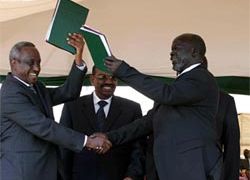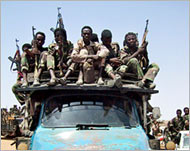Sudan seeks $2.6bn to rebuild south
Sudan has said it will seek $2.6 billion to rebuild its south devastated by Africa’s longest civil war, but donors are wary because of the continued conflict in Darfur.

UN Secretary-General Kofi Annan, leaders of the Sudanese government and the former rebel Sudan People’s Liberation Movement (SPLM) will attend 60-nation talks in Oslo on Monday and Tuesday after a January accord to end the 21-year war.
Sudan’s First Vice-President Ali Usman Muhammad Taha said during talks by Sudanese women in Oslo on Sunday evening that although he had signed a peace deal, he knew that peace went beyond signing papers.
“The accord is a win-win for everybody,” said SPLM leader John Garang, attending the talks with Taha. Both said aid needs were huge after a war that had left a generation with no memory of peace.
Billions needed
A report by the UN and the World Bank, backed by Khartoum and the SPLM, says Sudan needs $2.6 billion in aid to the end of 2007 to help build everything from roads to schools.
 |
|
Both rebels and officials say aid |
More than two million people were killed and four million displaced by the war pitting the south against the north, in a conflict complicated by issues of oil, ethnicity, religion and ideology.
Taha said donors should not be reluctant because of the separate conflict in Sudan’s western Darfur region.
“Sudan needs help,” Taha said. “And when people in Darfur see that the prize for peace is support and encouragement by the international community, I think that’s a very important incentive for peace to prevail in Darfur.”
War crimes?
Last week, however, Annan gave the International Criminal Court (ICC) a sealed list of 51 people suspected of war crimes in Darfur, where Washington says genocide has taken place. Taha declined to answer a question about the ICC.
|
Southern suffering *The poverty rate in the south is about 90% (50% in the north) *In 2003 only 20% of children enrolled in school in the south |
Under the January north-south peace deal, Sudan and the SPLM will set up a coalition government, decentralise power, share revenue from oil production and form joint military units.
The $2.6 billion in aid request is about a third of estimated reconstruction needs of $7.9 billion. Most of the cash will come from Sudan’s oil output of 320,000 barrels per day.
In the south, 90% of people live in poverty, only about a third of young adults are literate and one child of every four dies before the age of five. Many women spend most of their time collecting water and fuel.
Darfur shadow
“Women have been the marginalised of the marginalised,” Garang said. He drew cheers at the women’s meeting by promising free primary education for all – even though he said that would only be achieved by 2015.
|
“If the situation in Darfur continues to worsen, neither we nor others will be able to support implementation of the comprehensive north-south peace agreement” |
Last week, a senior US official said Washington and other rich donors would pledge significant new aid for southern Sudan, but added that Darfur cast a shadow.
“If the situation in Darfur continues to worsen, neither we nor others will be able to support implementation of the comprehensive [north-south] peace agreement,” he said on condition of anonymity.
US Deputy Secretary of State Robert Zoellick will attend the Oslo talks on Tuesday.
The Darfur crisis was triggered in February 2003 when rebel groups took up arms against the government in a struggle over power and scarce resources. More than two million people have fled their homes and tens of thousands have died.